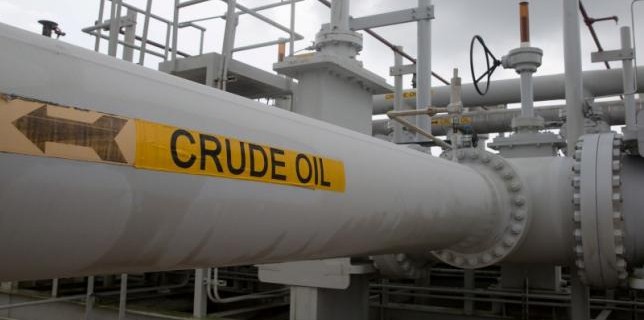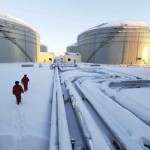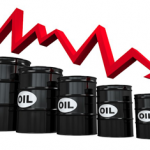Saudi, Russia Vow Oil Cooperation Without Agreeing to Freeze

-
Countries have ‘number of tools’ for joint action, Novak says
-
Oil pares gains as rapprochement falls short of concrete steps
The world’s top two crude-oil producers pledged to cooperate to stabilize global markets, while failing to announce any specific measures to bolster prices.
“We have a number of tools at our disposal for joint actions,” Russian Energy Minister Alexander Novak said Monday following a meeting with his Saudi counterpart Khalid Al-Falih at the G-20 summit in China. Both agree that an output freeze would be the most constructive instrument, he said.
Despite promise of a “significant” announcement — leading to a 5.5 percent jump in oil prices — no concrete actions were revealed at the joint press briefing in Hangzhou. Al-Falih denied there was any current need to cap production, saying “markets are trending in the right direction.”
Brent crude added 11 cents to $47.74 a barrel at 12:40 p.m. Singapore time Tuesday. The global benchmark pared gains Monday to close up 1.7 percent. Russian President Vladimir Putin said last week he’d like OPEC and Russia to agree on an output freeze, boosting speculation that members of the Organization of Petroleum Exporting Countries and other major producers might strike such an accord at talks this month in Algeria.
“At first appearance it sounds a little bit as new wine in old bottles,” Axel Herlinghaus, senior commodities analyst at DZ Bank AG, said by e-mail. “In the past there was no lack of ambitious announcements, but a lack of decisive follow-up actions.”
Rare Briefing
While Russian-Saudi cooperation is yet to yield firm steps toward steadying the market, a joint press conference between the two oil giants is rare. It shows a growing trust and understanding that collaboration is vital to oil’s recovery, the ministers said.
In a joint statement, the two countries confirmed they’ll hold further talks during the International Energy Forum in Algiers this month. They’ll also coordinate a bilateral working group on oil and gas cooperation in October and meet at the OPEC ministerial summit in Vienna in November.
Potential freeze terms will be discussed in September, Russian news service RIA Novosti reported, citing Novak. Russia would be ready to join an agreement to cap output at the level of any month in the second half, the minister said, while Al-Falih insisted he’ll work with OPEC members to come to a joint understanding on coordination.
“We still cannot shoulder the responsibility alone; we will play the leadership role and we will catalyze others to join in,” Al-Falih said. “We are optimistic that the Algiers meeting would provide a quorum.”
Several OPEC countries voiced their support for the Russian-Saudi pledge to cooperate. The oil ministers of the United Arab Emirates, Kuwait and Qatar welcomed the joint statement, while Algerian Energy Minister Noureddine Bouterfa said it shows producers must reach an accord on output.
“Oil below $50 is not acceptable,” Bouterfa said. “Countries need income to invest, to develop production and industries.”
Russia and Saudi Arabia are considering the possibility of limiting output for three to six months, or maybe longer, RIA Novosti reported, citing Novak.
A freeze proposal was derailed in April over Saudi Arabia’s insistence that Iran participate. Yet the effect of the prolonged slump in crude prices — stuck at half the levels seen two years ago — has pushed oil-market rivals to collaborate.
Iran’s Return
Putin has said oil producers now recognize that Iran, which has mostly restored the output halted during three years of trade restrictions, deserves to complete its return to world markets.
Iran showed Monday that it’s ready to pump more crude, with state-run National Iranian Oil Co. saying the country can raise production to 4 million barrels a day in two to three months from the current daily level of about 3.8 million.
Russia and Saudi Arabia “share the similar view that Iran should be allowed to reach pre-sanctions level,” Novak said Monday, adding that OPEC hasn’t reached a consensus on whether Iran has already reached that level of production.
While Iran ramps up, other producers including Nigeria and Libya have seen supplies disrupted in 2016 while U.S. output has declined, helping push up oil 70 percent from the 12-year lows reached in January.
Supply and demand will come “more or less into balance this year,” Al-Falih said. A “coordinated, appropriate, collective decision on production would help bring that balance.”
Source: Bloomberg




























